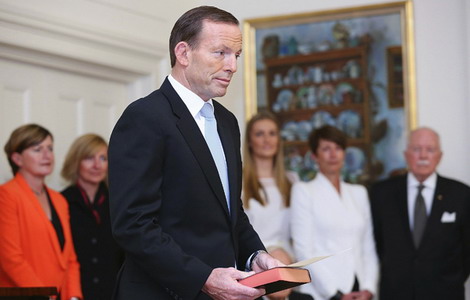Fed surprise: No pullback in bond purchases
Updated: 2013-09-19 16:04
(Agencies)
|
||||||||
WASHINGTON - The US Federal Reserve, not convinced that the US economy is healthy enough to ease its stimulus even slightly, surprised investors expecting a slight cut in the Fed's $85 billion in monthly bond purchases.
Wall Street celebrated the prospect of continued low interest rates Wednesday by sending stocks surging to a record high.
In a statement after a policy meeting, the Fed said it has no set timetable for reducing its stimulus. It all depends how the economy fares.
Chairman Ben Bernanke explained later at a news conference that there are good reasons for the Fed to be cautious about slowing a bond-purchase program that's designed to keep long-term rates ultra-low: The Fed has yet to see conclusive evidence that the job market and economy are approaching full health.
Rates on mortgages have surged, and the Fed's bond purchases are needed to hold those rates down and keep home buying affordable for ordinary people.
A budget stalemate in Congress and the threat of a government shutdown as soon as next month are holding back growth and putting the economy at risk.
"Conditions in the job market today are still far from what all of us would like to see,'' Bernanke said at his news conference.
Stocks spiked immediately after the Fed released its statement at the end of its two-day policy meeting and closed at a record high. The Dow Jones industrial average jumped 147 points or 1 percent.
The Fed's decision to maintain the pace of its purchases raised hopes for lower rates on bonds and consumer and business loans. Bond yields sank. The yield on the 10-year Treasury note fell to 2.71 percent from 2.85 percent, the biggest one-day drop in nearly two years.
Since May, when Bernanke first signaled that the Fed could reduce its bond purchases this year, average rates on long-term fixed mortgages have surged more than a full percentage point to near two-year highs.
The average on the 30-year mortgage is at 4.57 percent, according to Freddie Mac. There are signs that higher mortgage rates have made it harder for people to afford homes. The rebound in the housing market has been a key pillar for the economy.
The Fed lowered its economic growth forecasts for this year and next year slightly. It predicts that the economy will grow just 2 percent to 2.3 percent this year, down from its forecast in June of 2.3 percent to 2.6 percent growth.

 Tapestry of Chinese culture and a Harvard teen's feeling
Tapestry of Chinese culture and a Harvard teen's feeling
 A simple but pure festival tradition
A simple but pure festival tradition
 Beijing's rabbit god returns
Beijing's rabbit god returns
 It's the real deal: Class explains genuine vs fake
It's the real deal: Class explains genuine vs fake
 An eclipse of the mooncake
An eclipse of the mooncake
 Australia's new government sworn in
Australia's new government sworn in
 Occupy Wall Street marks its second anniversary
Occupy Wall Street marks its second anniversary
 Learning China through its food
Learning China through its food
Most Viewed
Editor's Picks

|

|

|

|

|

|
Today's Top News
Fed surprise: No pullback in bond purchases
Sanctions no solution to DPRK issue
A new tool to measure greenhouse gas is out
Gunman's mother apologizes
Godiva's chocolate mooncakes find favor in US
CNOOC makes trading debut in Toronto
China asked to help end Syrian conflict
Trade treaties trade spotlight
US Weekly

|

|





